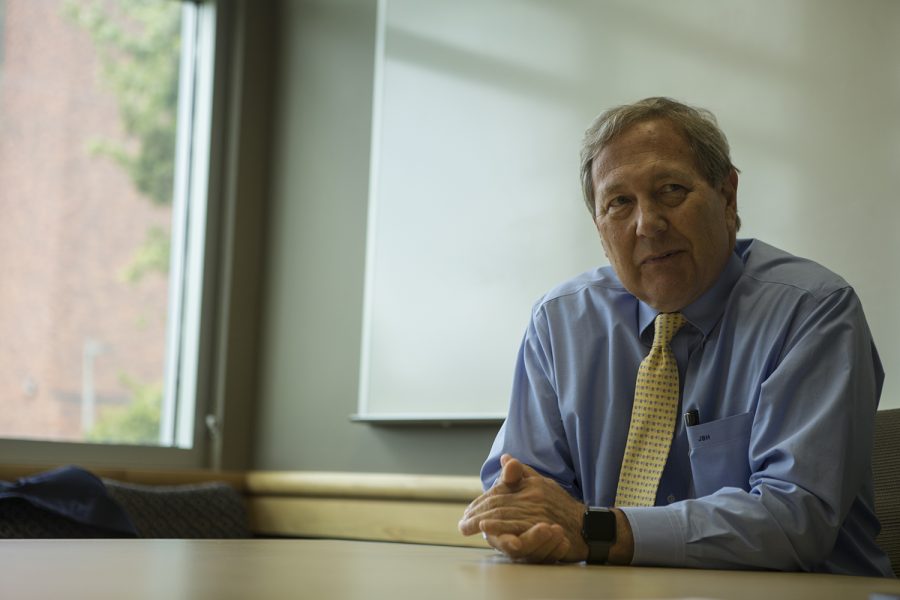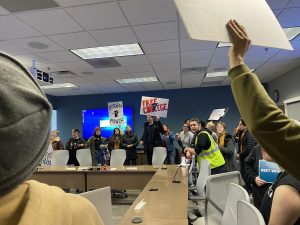Iowa lawmakers question UI president on utility system public/private partnership
University of Iowa President Bruce Harreld gave a presentation on the utilities system public/private partnership to Iowa lawmakers and answered their logistical questions.
University of Iowa President Bruce Harreld sits down for an interview with the Daily Iowan in the Adler Journalism Building on May 2, 2019.
February 5, 2020
DES MOINES — Iowa lawmakers presented the University of Iowa with concerns about the long-term feasibility of the institution’s utility system public/private partnership during a state House Appropriations Committee meeting Wednesday.
UI President Bruce Harreld outlined how the public/private partnership came about, how it will play into the UI’s strategic plan, how the partnership will work, and background on the partnering French firms ENGIE and Meridiam.
The two firms form the concessionaire Hawkeye Energy Collaborative, which will provide the UI with an upfront lump sum of $1.1 billion. The UI will invest that amount minus $166 million for outstanding utility system bond debt and consultant fees — a total of around $999 million — into a new endowment that is expected to generate $3 billion over the course of the 50-year agreement.
Harreld told legislators the partnership will fill an annual $15 million funding gap left after state appropriations and tuition to support the UI’s strategic plan. However, he emphasized, the partnership is not a replacement for state appropriations to the UI from lawmakers in Des Moines.
Rep. John Forbes, D-Urbandale, said the drop in the UI’s U.S. News rank is alarming and is an indicator of the way the Legislature is allocating money to the regents over the past few years. In his mind, he said, it appears that the state is forcing the UI to leverage assets.
Forbes’ concern is the financial risk involved with the partnership if the stock markets shift in the future. He asked whether the UI would spend the additional funding conservatively.
RELATED: UI faculty discusses early stages of public/private partnership allocations
“… How much more money would the Legislature have to allocate on a yearly basis to the point where you wouldn’t have to go out and leverage assets of the university to cover the costs of higher education?” Forbes asked.
Regent David Barker, who has a Ph.D. in economics from the University of Chicago and was an economist at the Federal Reserve Bank of New York, said he did not see the partnership as the UI being forced to leverage assets, but sees an opportunity to use the utility system in a more financially efficient way because the firms can take tax deductions the university cannot, and the private partners are willing to pay for that.
“This is a way for us to take advantage of that opportunity, regardless of the present financial situation,” Barker said. “If we had more money appropriated to us we could take good use of that also, but regardless of that we think, this is a worthwhile project.”
Rep. Mary Mascher, D-Iowa City, asked Harreld about potential risks the partnership posed and how state funding impacted the agreement’s trajectory.
“What if the state doesn’t fulfill our commitment in terms of funding to the regents or to the University of Iowa?” Mascher asked. “How does that impact this whole plan?”
One of Harreld’s concerns was if the UI had the maturity to spend the money wisely in order to improve the university, and how to structure the process in which public/private partnership proceeds are allocated in a way that imposes discipline.
His second concern was if the partnership would accelerate state disinvestment.
“If we take this new set of resources and don’t make a meaningful movement in our performance relative to our peer institutions … this will have all been for nothing,” Harreld said.
Rep. Gary Worthan, R-Storm Lake, asked what will happen in 2070 when the partnership ends.
“Do we have a boat anchor that’s been depleted, has a massive cost to upgrade,” Worthan said. “What happens in 2070?”
The UI has complete control over the capital investment of the utilities system, Barker said, with standards in place for the firms to follow in regards to maintaining the facility’s condition. A team will monitor the system and operations will revert back to the UI at the end of the partnership, he added.
After the meeting, Harreld told The Daily Iowan that he remains concerned about state disinvestment now that the UI expects to have “an adequate set of funding soon to fill our strategic plan” from the partnership proceeds.
“I think the best defense against that is to continue to tell them that we’re worried about that as well as suggesting to citizens throughout the state that they care about higher education — and of course I think they should — they should be thinking about that as they elect representatives in the state Legislature,” he said.






